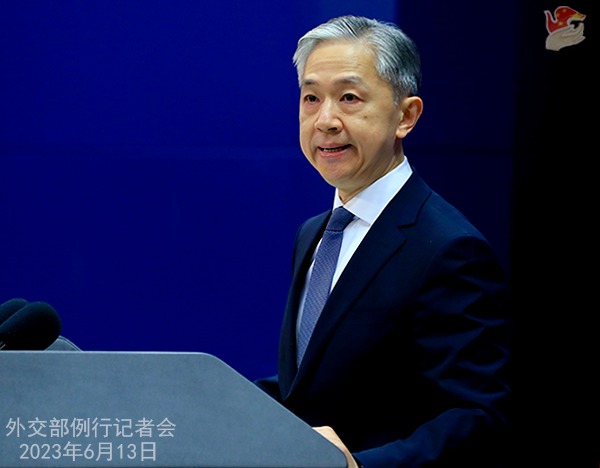Dragon TV: It was reported yesterday that TEPCO started trial operation of the nuclear-contaminated water discharge facility at the Fukushima Daiichi Nuclear Power Plant, which will take two weeks. Japanese media assessed that the Japanese government will complete all preparation work for the discharge by the end of June and launch the discharge after the IAEA Task Force releases the final review report. What is your comment?
Wang Wenbin: The Japanese government has begun the trial operation of the nuclear-contaminated water discharge facility. This means that Japan has taken another step towards pushing through the discharge despite international opposition. The discharge of nuclear-contaminated water bears on the global marine environment and public health and is by no means a domestic matter of Japan. What Japan has done in disregard of strong domestic and international opposition is both irresponsible and unlikely to get support.
No matter how Japan tries to justify its discharge plan, it will not hide its attempt to shift risks. The discharge violates Japan’s obligations to protect and preserve the marine environment as outlined in UNCLOS and other international instruments. Discharge into the ocean is not the only option—and certainly not the safest and most optimized way—for treating the nuclear-contaminated water. By choosing this option out of consideration for economic cost, Japan is in fact spilling the risks of nuclear pollution to humanity all over the world.
No lip service can change the reality. Japan has yet to prove that the discharge is safe and harmless. Data released by Japan shows that close to 70 percent of the treated water is not up to standard. However, Japan has created the pseudo-scientific term “treated water” in an attempt to cover up the unidentified risks of the plan. What consequences will it bring to the ecological environment, food safety and public health in Pacific rim countries if millions of tonnes of nuclear-contaminated water is dumped into the ocean? Japan has not fully provided scientific evidence and data in this regard.
No blueprint can guarantee a project’s viability. The effectiveness and maturity of Japan’s treatment facility has received no third-party assessment or certification, and has repeatedly malfunctioned. The discharge will last 30 years or even longer. In the future, a huge amount of new nuclear contaminated water is expected to be created. Japan has been unable to prove the long-term reliability of the treatment facility, neither has it provided a systematic and comprehensive environment monitoring plan. Its current monitoring plan covers a very small area with few locations and low frequency of monitoring, which makes it difficult to promptly identify abnormal situation such as when the discharged water is not up to standard.
I also want to stress that Japan cannot use the final review report of the IAEA Task Force as a “shield” from critics or “greenlight” for the discharge. As early as July 22 last year, the Japanese government officially approved the discharge plan and has since declared multiple times that it would not postpone the implementation of the plan. In fact, the Task Force has a very limited mandate as agreed between Japan and the IAEA, and is not authorized to evaluate other options than the discharge into the ocean. Therefore, no final report shall be used as an excuse for Japan to dump the nuclear-contaminated water into the ocean.
China strongly urges Japan to faithfully fulfill its international obligations, stop pushing through the discharge plan, fully explore and evaluate the alternatives to ocean discharge to ensure that the nuclear-contaminated water is handled in a scientific, safe and transparent manner, and agree to rigorous international oversight. We hope Japan will stop taking the wrong steps in time. Spilt water cannot be gathered up again.













